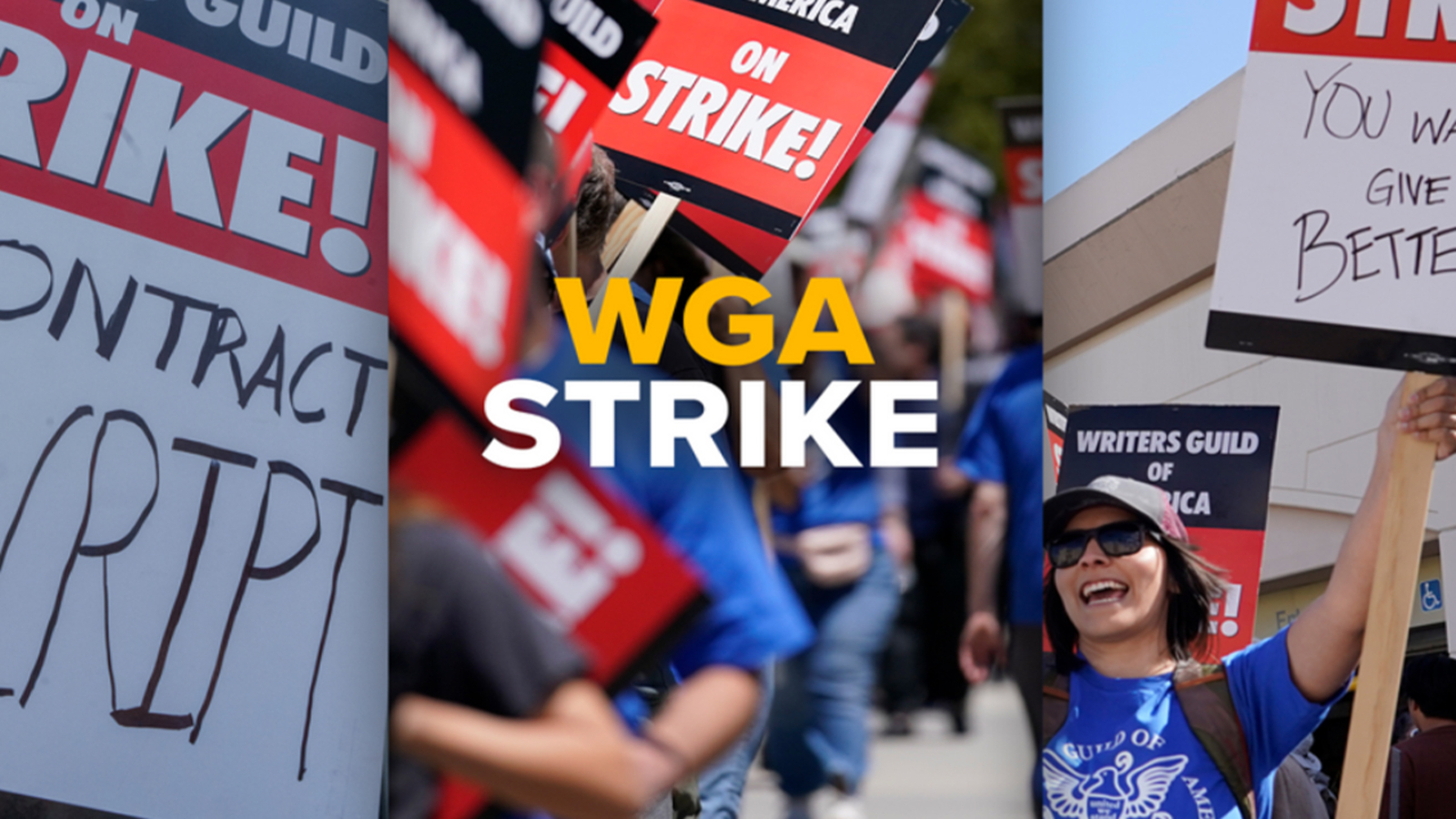WGA And SAG-AFTRA Strike: The Impact On Hollywood's Future

Table of Contents
The Core Issues Fueling the Strikes
The WGA strike and SAG-AFTRA strike are fueled by several critical issues threatening the livelihoods and creative control of writers and actors. These core concerns are shaping the ongoing negotiations and will likely define the industry landscape for years to come.
Fair Wages and Residuals in the Streaming Era
The traditional television model, with its clear revenue streams and predictable residual payments, has been fundamentally disrupted by the rise of streaming platforms. This shift has had a devastating impact on the compensation of writers and actors.
- Diminishing residuals from streaming platforms: Unlike traditional television, streaming services often offer minimal or no residuals to writers and actors, even for wildly successful shows. This has resulted in significant income loss for many creatives.
- Unfair profit-sharing models: The lack of transparency around streaming profits means writers and actors are often unable to fairly negotiate their share of the revenue generated by their work.
- The rise of "mini-rooms" and their impact on writer compensation: The increasing use of smaller, less-compensated writing teams ("mini-rooms") has lowered overall writer pay and eroded job security.
- The lack of transparency in streaming viewership data: Without accurate data on viewership, it’s difficult for writers and actors to negotiate fair compensation based on the actual success of their projects. This lack of transparency fuels distrust and contributes to the ongoing dispute. Keywords: Streaming residuals, actor pay, writer pay, fair compensation, profit sharing, streaming viewership.
The Threat of AI in Creative Fields
The rapid advancement of artificial intelligence (AI) poses a significant threat to the future of creative work in Hollywood. Both the WGA and SAG-AFTRA have voiced serious concerns about the potential misuse of AI in scriptwriting and performance.
- AI replacing human writers: The fear exists that AI could be used to generate scripts, potentially eliminating the need for human writers altogether.
- AI-generated scripts: While AI can assist with writing tasks, its use raises concerns about the originality and artistic merit of the resulting scripts.
- The potential for AI to devalue human creative work: The widespread adoption of AI in writing and performance could lead to a devaluation of human creativity and a reduction in employment opportunities for writers and actors.
- The ethical considerations of AI in entertainment: The use of AI in entertainment raises complex ethical questions about ownership, copyright, and the very nature of artistic creation. Keywords: AI in entertainment, AI scriptwriting, AI actors, ethical AI, creative AI.
The Ripple Effects Across the Entertainment Industry
The WGA and SAG-AFTRA strikes have already caused significant disruption across the entertainment industry, with far-reaching consequences.
Production Shutdowns and Delays
The most immediate impact of the strikes is the widespread shutdown of film and television productions.
- Halted productions: Numerous film and television projects have been put on hold, indefinitely delaying the completion of many anticipated releases.
- Delayed release dates: The release dates of countless films and television shows have been pushed back, disrupting studio schedules and impacting marketing campaigns.
- Financial losses for studios: The production shutdowns are resulting in significant financial losses for studios and production companies.
- The impact on support staff (crew, etc.): The strike has also had a significant impact on countless support staff, including crew members, whose livelihoods depend on ongoing productions.
- Potential for project cancellations: Some projects may be canceled altogether, resulting in permanent job losses and a significant reduction in future content. Keywords: Production delays, Hollywood shutdown, film production, TV production, economic impact of strike.
Impact on the Fall TV Season and Beyond
The strikes are poised to significantly impact the upcoming fall TV season and beyond.
- Fewer new shows: The lack of new scripts and the inability to film new episodes mean that the fall television schedule will be significantly impacted.
- Delayed premieres: Many highly anticipated shows will likely be delayed or canceled altogether.
- Potential for network schedule disruption: Networks are struggling to fill their schedules, leading to uncertainty and potential disruption.
- The impact on advertising revenue: The delays and cancellations will inevitably affect advertising revenue for networks.
- The long-term effects on content creation: The strikes could lead to a shortage of new content for years to come. Keywords: Fall TV season, TV schedule, network television, content creation, advertising revenue, television delays.
Potential Long-Term Impacts on Hollywood
The WGA and SAG-AFTRA strikes could have profound and lasting consequences on Hollywood’s future.
Redefining the Power Dynamics in Hollywood
These strikes represent a potential turning point in the power dynamics between studios, networks, and creative professionals.
- Increased bargaining power for unions: The strikes have demonstrated the collective power of the unions and their ability to disrupt the industry.
- Potential for contract reform: The strikes could lead to significant contract reforms that address the core issues of fair wages, residuals, and profit sharing.
- The possibility of a more equitable distribution of profits: The negotiations may lead to a more equitable distribution of profits between studios and creatives.
- The long-term consequences for the creative process: The outcome of the strikes will have a significant impact on the creative process, affecting how stories are conceived, written, and produced. Keywords: Union power, contract negotiations, industry reform, equitable distribution, creative control.
The Future of Storytelling in the Digital Age
The strikes raise fundamental questions about the future of storytelling and creative expression in the digital age.
- The impact of the strike on creative innovation: The disruption caused by the strikes may ultimately force the industry to reconsider its approach to content creation and encourage innovation.
- The potential for alternative platforms to emerge: The strike could create opportunities for alternative platforms and distribution models to emerge, potentially challenging the dominance of major studios and streaming services.
- The future of content creation and distribution: The strikes are forcing a reevaluation of the entire content creation and distribution pipeline.
- The changing relationship between creators and audiences: The strikes may lead to a renewed focus on the relationship between creators and audiences, potentially fostering a more collaborative and equitable creative environment. Keywords: Future of storytelling, content distribution, digital media, creative innovation, audience engagement.
Conclusion
The WGA and SAG-AFTRA strikes are not merely labor disputes; they represent a pivotal moment in the evolution of Hollywood. The outcomes will profoundly affect the future of content creation, distribution, and the power dynamics within the industry. The issues at stake—fair wages, the impact of streaming, and the rise of AI—demand careful consideration and long-term solutions. The impact of the actors' strike and writers' strike continues to unfold, reshaping how we understand the value of creative work.
Call to Action: Stay informed about the ongoing WGA and SAG-AFTRA strike and its implications for the future of Hollywood. Understanding the complexities of this situation is crucial to advocating for a more equitable and sustainable entertainment industry. Follow the news closely and contribute to the ongoing conversation about the future of the WGA and SAG-AFTRA, and the future of entertainment itself.

Featured Posts
-
 A Stunning Solo Victory For Pogacar At The Tour Of Flanders
May 26, 2025
A Stunning Solo Victory For Pogacar At The Tour Of Flanders
May 26, 2025 -
 Best Places To Eat Shrimp In The Hudson Valley
May 26, 2025
Best Places To Eat Shrimp In The Hudson Valley
May 26, 2025 -
 Hoka Cielo X1 2 0 A Speed Focused Running Shoe Analysis
May 26, 2025
Hoka Cielo X1 2 0 A Speed Focused Running Shoe Analysis
May 26, 2025 -
 Stories Of Survival Idf Soldiers Captive In Gaza
May 26, 2025
Stories Of Survival Idf Soldiers Captive In Gaza
May 26, 2025 -
 Vozachi Na Mertsedes Kazneti Pred Trkata Vo Bakhrein
May 26, 2025
Vozachi Na Mertsedes Kazneti Pred Trkata Vo Bakhrein
May 26, 2025
